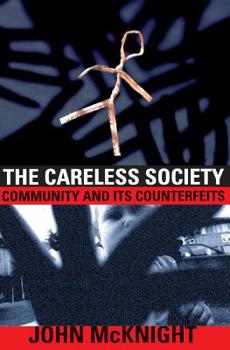The Careless Society: Community and Its Counterfeits
Select Format
Select Condition 
Book Overview
Amid all the hand-wringing about the loss of community in America these days, here is a book that celebrates the ability of neighborhoods to heal themselves from within. John McKnight shows how competent communities have been invaded and colonized by professionalized services -- often with devastating results. Overwhelmed by these social services, the spirit of community falters: families collapse, schools fail, violence spreads, and medical systems...
Format:Paperback
Language:English
ISBN:0465091261
ISBN13:9780465091263
Release Date:April 1996
Publisher:Basic Books
Length:208 Pages
Weight:0.50 lbs.
Dimensions:0.6" x 5.4" x 8.0"
Customer Reviews
5 ratings
A Strong Diagnosis of the Diagnostic Approach
Published by Thriftbooks.com User , 18 years ago
McKnight, a scholar of social policy working at Northwestern University, throws harsh words at the medical, advocacy, and professional institutions. His observations are not only insightful, but they are well reasoned as well as articulated in a clear way. Although it may seem as though his writings underestimate the professional ethic of modern medicine, it is clear to an understanding reader that his purpose isn't to simply throw mud, but to inspire communities. Using examples from his home town in Chicago, McKnight illustrates that when a community is faced with challenge, the best "solution" may not really be a "solution," but a habit. Rather than simply looking at communities as a group that needs to have their problems solved, it is more important to focus on the assets inherent in all of its individuals. McKnight wishes to save communities from the obfuscating languages of medicine and professionalism. His book, "The Careless Society" is a triumph for the common good.
Must Reading.
Published by Thriftbooks.com User , 18 years ago
I worked in the mental health-social service industry for many years. From the beginning it was impressed upon me that clients without economic value to the agency get booted out the door. And on numerous occasions I observed how families were broken apart because the government will spend money on professionals but wont spend money for a motel and a few meals or a car repair. On the other-hand McKnight misses a salient point about people: They often get into trouble because no one is caring for them at home. And when you give cash to irresponsible people they dont suddenly become prudent and wise. They still neglect their kids, dont pay the rent, and get the electric cut-off.
Must read for any health professional
Published by Thriftbooks.com User , 19 years ago
This book tests our conventional wisdom about "care." As a Registered Nurse with a Masters in Health Admin., I applaud McKnight's truthful look into the world of health care - or rather "disease care." Our lives have become over dependent on professionals, less dependent on ourseleves and our communities. We have forgotten that care begins with us - and we can never really pay anyone to care for us. Quick, insightful read - hope for more from McKnight on this critical topic.
an explanation of our struggle to be empowered
Published by Thriftbooks.com User , 25 years ago
this book is a brilliant analysis of the struggle users of services face when trying to find help to live a full life. The sentence which I will always remember is 'The problem we face is not one of weak services, but weak communities'. As a disabled person I found the willingness to confront the dependency of able-bodied providers on our manufactured 'needs' refreshing and enlightening. John McKnights thinking about the nature of communities and how to begin to re-build them very stimulating, particularly as his vision includes me as a community builder. Read it!
How social service agencies destroy community supports.
Published by Thriftbooks.com User , 26 years ago
As someone who works in a nonprofit social service agency, I was handed McKnight's book by the executive director of a local foundation. It made for illuminating reading. McKnight explains how agencies isolate and target populations for their own convenience - determining the needs of their "client" rather than helping individuals express their own dreams and desires and working toward solutions. This is a "must read" for agencies whose goal is to build caring communities, allowing people with disabilities to determine their futures for themselves. Of particular interest is the section on grief counseling, describing how the professional grief vampire isolates their "clients" from the circles of support provided by friends and neighbors that have nurtured the grieving for generations.





